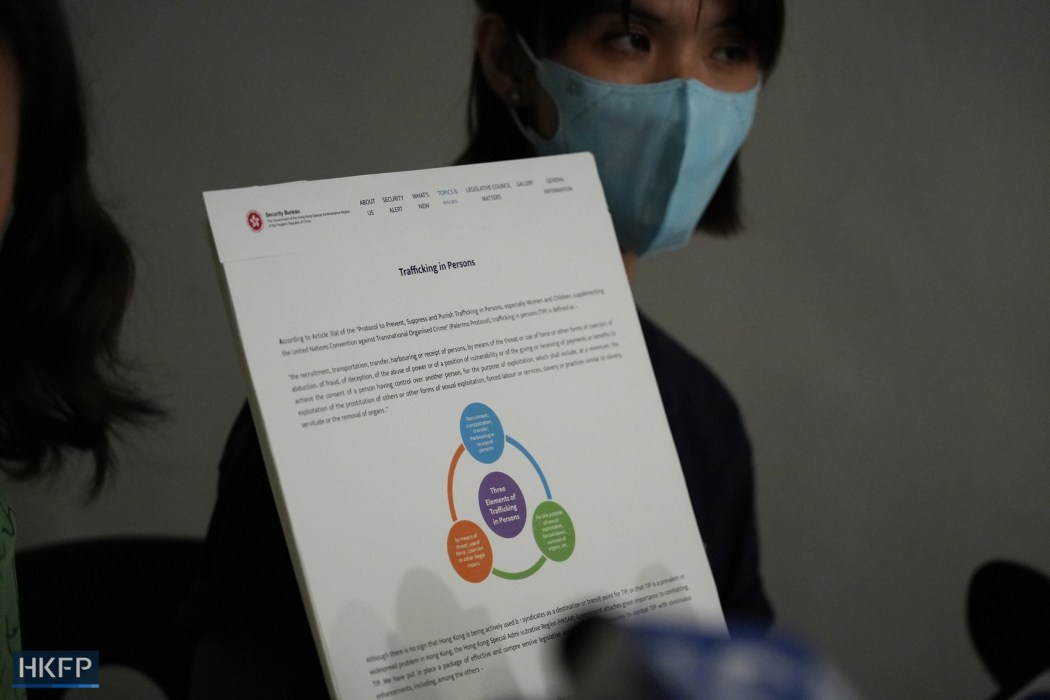Hong Kong should enact laws to target human trafficking, a legal scholar said on Wednesday, amid an increasing number of calls for help from Hongkongers allegedly trafficked to Southeast Asia.
As of Tuesday, the Immigration Department and the police had received requests for assistance from 39 Hong Kong people, the Security Bureau told HKFP on Wednesday. Among them, 18 of them were confirmed to be safe, and 12 had returned to Hong Kong.

Of the 21 Hongkongers whose personal freedom remains restricted, 10 are in Myanmar and 11 are in Cambodia.
Patricia Ho, principal lecturer at the University of Hong Kong’s Faculty of Law, and founder of Hong Kong Dignity Institute, said that while she was pleased with the speed with which the Hong Kong government had acted to help the victims and make arrests, existing laws might not be able to reflect the severity of the crime.
The Hong Kong police have arrested seven people over suspected scams linked to the trafficking as of Monday. Three people have been charged with allegedly conspiring to defraud.
“These people might not just be simply committing fraud, if the people who were arrested know that these people [the victims] will face serious [risks to their] personal safety, and lose their freedom, but still sold [the victims] elsewhere,” Ho said.
“If there are legislations to target the offence of human trafficking, then [we] might be able to effectively regulate crimes happening overseas.”
Michelle Wong, programme manager of Stop Trafficking of People (STOP), which is part of the charity Branches of Hope that serves refugees, asylum seekers and human trafficking survivors, said that victims might be reluctant to report their case over fear of the repercussions related to crimes they were forced to commit.

According to the police, victims of human trafficking often see their travel documents confiscated once they arrive in another country, and are made to engage in crimes such as carrying out online fraud or investment scams.
Victims’ recordings
STOP received voice recordings from two victims of alleged trafficking, John and Dee, who were in their 30s.
In the recordings, Dee, who said he has returned to Hong Kong, said he was trafficked to Myanmar after flying to Thailand following a job advertisement he saw on Facebook. The 30-year-old said he was released after his family paid his captors a ransom.
John said he was on holiday in Thailand visiting a friend when he was forced to cross the border into Myanmar. According to the recordings, he has reached out to the Immigration Department in Hong Kong, as well as to the Chinese embassies in Thailand and Myanmar, but no progress had been made.
Since reports of Hong Kong people suspected of being trafficked to Southeast Asia made headlines in the city, the Immigration Department has urged victims to contact the government through a hotline, WhatsApp, or via an online form.

“The WhatsApp is okay… There is no reason to ask people to fill in forms, it’s not that logical,” John said in one recording. “If I can take a photo and video for you, and fill in a form, then really I would not need you to save me.”
‘Chicken and egg’
Last month, the Hong Kong government “rebutted” the US Department of State’s Trafficking in Persons Report, which listed Hong Kong on the Tier-2 Watch List.
The government said in July that human trafficking was “never a prevalent problem in Hong Kong,” and that the report’s assessment was “unfair and not substantiated by facts.”
Ho, who said that she has been contesting this perspective, said that the issue was “chicken and egg,” as the lack of relevant provisions would lead to the conclusion that it was not a problem.
“I think one of the issues is that human trafficking is a very hidden crime, and when there isn’t a law that specifically targets human trafficking as a data point even for the law enforcement, so that for example when they arrest somebody, and say that they are a trafficker or a victim of human trafficking, of course the data we see will be that there are zero crimes in that category.”
Support HKFP | Policies & Ethics | Error/typo? | Contact Us | Newsletter | Transparency & Annual Report | Apps
Help safeguard press freedom & keep HKFP free for all readers by supporting our team

LATEST FROM HKFP
HKFP has an impartial stance, transparent funding, and balanced coverage guided by an Ethics Code and Corrections Policy.
Support press freedom & help us surpass 1,000 monthly Patrons: 100% independent, governed by an ethics code & not-for-profit.










